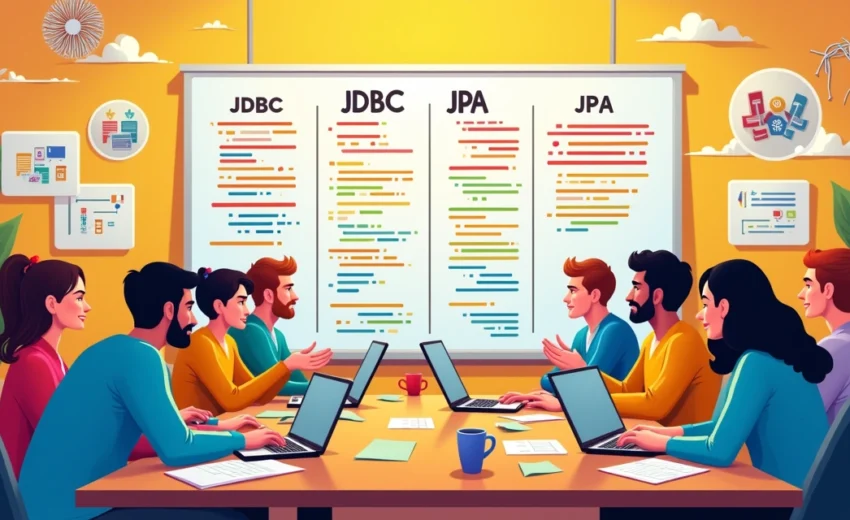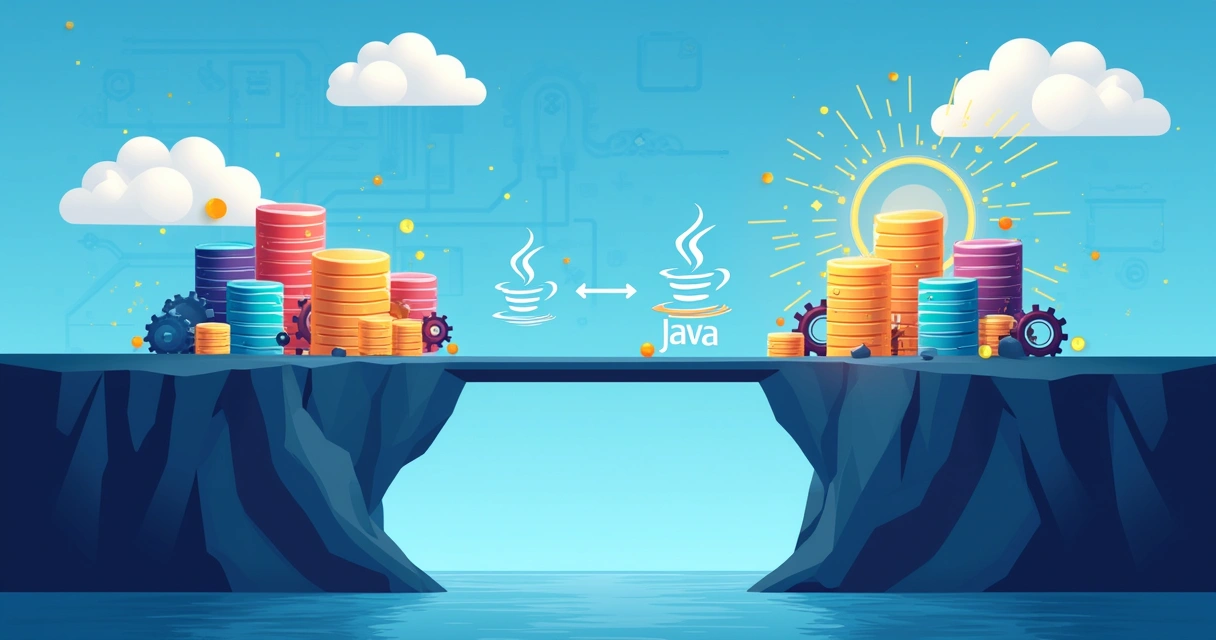
Understanding the relevance of JPA and JDBC in modern development
When working with databases in Java, it’s essential to understand the tools available. Two common options are JDBC and JPA, each serving a different purpose. JDBC is like having the keys to the car; it gives you direct control over SQL queries. This can be beneficial if you need precise performance but often results in lengthy and repetitive code. It’s great for those who love to be hands-on.
On the flip side, JPA simplifies the process significantly. Instead of writing boilerplate SQL, you get to deal with objects, which makes your code cleaner and easier to understand. It’s like using a ride-sharing app instead of driving yourself. You can focus more on what your application does and less on how it communicates with the database.
Here are a few key points to consider when choosing:
- Easier Development: JPA can reduce the amount of code you write.
- Performance Control: JDBC allows for finely-tuned performance.
- Legacy Systems: JDBC is often a better fit for older applications.
 The evolution of JDBC: A classic approach to database interaction
The evolution of JDBC: A classic approach to database interaction
JDBC, ou Java Database Connectivity, is a crucial tool for Java developers who want to connect with databases. Think of it as a bridge that lets your Java applications communicate with different types of databases using a common language. However, while JDBC is powerful, it can also be a bit tricky to navigate, especially for beginners.
When using JDBC, you’ll typically follow a straightforward process: establish a connection, execute SQL queries, and then handle the results. Despite its simplicity, there are some important things to keep in mind to make your experience smoother:
- Connection Management: It’s vital to always close your connections after using them. Failing to do so can lead to memory leaks.
- Prepared Statements: These not only enhance performance but also help protect your application from SQL injection attacks. It’s like locking your database doors against unwanted guests.
- Error Handling: Make sure to implement solid error handling. This way, if something goes wrong, you can respond appropriately rather than letting your application crash unexpectedly.
Even with its quirks, many developers still prefer JDBC because it gives more control over database interactions. If you’re experienced with SQL, this can be a huge advantage. In situations where you need direct access to your database, JDBC remains a reliable choice that can fulfill your needs efficiently.
JPA: An overview of Java Persistence API
Understanding JPA can really simplify how you interact with databases in your Java applications. Instead of writing complex SQL queries, you can work with your data through straightforward Java objects. Think of it like cooking: rather than memorizing a recipe, you have all your ingredients neatly arranged, making the process easier and more enjoyable.
With JPA, you treat your data as objects. This means you focus on your application’s needs instead of getting bogged down in SQL syntax. Here are some key features you’ll find useful:
- Entity Management: You define your data structures as classes. Each class corresponds to a table in the database, allowing you to easily manage data.
- Query Language: You use JPQL, a powerful query language similar to SQL, but designed for objects. This lets you get the data you need without diving deep into SQL.
- Database Independence: Whether you use MySQL, PostgreSQL, or another database, JPA abstracts much of the complexity, making your code more portable.
In essence, JPA behaves like a helpful assistant, streamlining the process of database interactions. It lets you write cleaner code while speeding up development time. However, understanding the balance between using JPA or going the traditional JDBC route is key to making the most of your development efforts.
 JDBC vs JPA: Key differences and when to use each
JDBC vs JPA: Key differences and when to use each
When diving into database programming, you might find yourself choosing between two popular options: JDBC and JPA. Understanding the differences can really help you pick the right tool for your needs. Let’s break it down.
JDBC is the go-to choice if you want to have complete control over your database interactions. Think of it like driving a manual car—every move you make influences how the car runs. You write raw SQL queries, which gives you flexibility and potential for optimization. However, this level of control can make your code messy and harder to maintain.
JPA simplifies things significantly. It lets you work with objects instead of writing complex SQL. Imagine it as driving an automatic car; it’s easier and you can focus on your destination rather than shifting gears. Because of this, JPA can speed up your development process, making your code cleaner and easier to read. However, you might lose some fine-tuned control over certain database operations.
To help you decide, here are some points to consider:
- Use JDBC When: You need high performance or are working with complicated queries.
- Use JPA When: You want faster development and appreciate cleaner code.
- Combine Both: Sometimes, a mix of JDBC and JPA can offer the best of both worlds.
By knowing your project’s requirements, you can choose the right approach and make database management more efficient.
How JPA utilizes ORM for efficient data handling
JPA makes working with databases in Java much easier and more intuitive. Instead of drowning in SQL queries, you can focus on the code through Object-Relational Mapping. What this means is that JPA allows you to treat your data as objects. Imagine you have a simple User object that represents a user in your application. With JPA, this User object directly corresponds to a table in your database. This connection simplifies how you manage and retrieve your data.
Using JPA has several benefits that can make your life easier:
- Less Boilerplate Code: JPA handles the nitty-gritty details of database interactions, saving you time and effort.
- Type Conversion: You don’t have to worry about manually converting between SQL types and Java types. JPA takes care of that.
- Simplified Queries: With JPQL, you can write queries using your class names instead of complex SQL statements. This makes your code cleaner and easier to read.
As your applications grow, the advantages of using JPA become even clearer. It helps ensure that your code stays organized and manageable. If you’re looking for a smoother way to interact with databases, embracing JPA can significantly enhance your development experience. In short, it’s all about making your data work for you without the extra hassle!
 Improving database performance with JPA and JDBC
Improving database performance with JPA and JDBC
Database performance can make or break your application’s efficiency. When using JPA or JDBC, there are several simple strategies to boost performance that you can easily apply.
First, it’s crucial to use connection pooling. This approach allows your application to maintain a pool of ready-to-use database connections. Instead of constantly opening and closing connections—which is slow—you can grab an existing one. It’s like having a set of keys for different rooms; you don’t need to make a new key every time you enter.
Next, optimize your queries. In JDBC, consider using prepared statements. This not only speeds up execution but also enhances security against SQL injection attacks. On the other hand, in JPA, be mindful of your loading strategies. Using eager loading pulls in all the data at once, while lazy loading fetches data only as needed, saving time and resources.
Here are some tips to help improve your database performance:
- Batch Processing: Group multiple updates into batches. This reduces trips to the database and speeds things up.
- Indexing: Properly index your tables to improve query response times. Think of it as having a well-organized book with an index.
- Monitor Performance: Regularly check your database’s performance to spot any issues that slow things down.
By focusing on these strategies, you can significantly enhance the performance of your database, creating a smoother experience for users.
The role of JPA in enterprise applications
When it comes to building large software applications, managing data can feel overwhelming. This is where JPA comes into play, helping you work with databases in a cleaner and more efficient way. Imagine you’re developing a user-friendly app. You want to spend your time focusing on the features, not getting lost in complicated SQL queries. JPA allows you to connect your Java objects directly to database tables, so you can operate with simple code.
JPA offers several benefits that can really make a difference:
- Increased Productivity: By minimizing repetitive tasks, JPA lets you focus on developing your application’s logic instead of dealing with cluttered SQL.
- Flexibility: You can easily switch between databases without rewriting loads of code, saving both time and effort.
- Built-in Optimizations: Features like caching help your application run faster, improving the overall user experience.
As your project grows, the ability to adapt becomes vital. JPA is designed to help developers create maintainable and scalable solutions while keeping code clean and understandable. As you continue building your enterprise applications, remember that JPA makes managing data simpler and more accessible. With the right tools in your hands, you’ll feel confident tackling complex tasks without getting bogged down by the nitty-gritty details. Embracing JPA can ultimately lead to more efficient, effective, and enjoyable development experiences.
 Real-world applications: Choosing between JPA and JDBC
Real-world applications: Choosing between JPA and JDBC
When choosing between JPA and JDBC, it helps to think about what you really need for your project. Both methods have unique advantages that can fit different situations. Let’s break this down a bit.
JDBC is best for projects where you need full control over the database. For example, if you are maintaining a legacy system that demands top-notch performance, JDBC allows you to fine-tune your SQL queries. This level of detail is fantastic for tasks like high-frequency trading apps, where every millisecond counts. It’s also ideal for complex data processing where you might need that extra speed.
In contrast, JPA is perfect for new applications or those requiring quick updates. It simplifies your code and makes it more manageable. If you’re developing a web app that requires frequent changes, JPA lets you focus on building features instead of writing complex SQL. Think about a startup environment where fast iterations matter; JPA can greatly speed up the development process.
Here are some pointers to help you decide:
- Choose JDBC: When performance is crucial and you need in-depth control over database interactions.
- Choose JPA: When you want to deliver faster and prioritize clean, maintainable code for newer applications.
- Consider both: Sometimes a mix works best, using JPA for general tasks and JDBC for specific performance needs.
Best practices for using JPA and JDBC in Java development
When working with JPA and JDBC, it’s crucial to follow some simple tips for better performance and reliability. These practices can make a big difference in how smoothly your application runs.
- Use Connection Pooling: Instead of repeatedly opening and closing database connections, use connection pooling. This allows your app to reuse connections, saving time and resources.
- Opt for Prepared Statements: Whether you’re coding with JDBC or JPA, always prefer prepared statements. They not only boost performance but also protect your application from SQL injection attacks, keeping your data safe.
- Be Smart About Loading Data: With JPA, think carefully about how you load data. Lazy loading can help you avoid loading unnecessary data all at once, making your application faster and lighter on memory.
Additionally, don’t forget the importance of proper indexing in your database. An indexed table can be like a well-organized bookshelf, making it easy to find what you need quickly. Regularly review and optimize your SQL queries as well. Small tweaks can lead to significant performance improvements, allowing your application to run more efficiently.
By following these tips, you can create a solid foundation for your projects. Using JPA and JDBC wisely can help you build applications that not only meet user needs but also run smoothly and efficiently. Keep these strategies in mind for a better coding experience!
Conclusion: Is JPA a worthwhile investment compared to JDBC?
When considering your options for database interaction in Java, both JPA and JDBC can be valuable. Each comes with its own advantages, and understanding them can help you make a better choice.
JPA is fantastic for projects that require quick development. It lets you deal with database operations without writing a lot of complex SQL. This can save you time and make your code easier to read. Think of it like having a powerful tool that simplifies your work.
On the other hand, you have JDBC, which gives you more control over your SQL queries. If performance is crucial—for instance, in a high-traffic application—JDBC might be the way to go. It allows you to fine-tune your database interactions for speed.
- Project Size: For larger projects needing flexibility, JPA is often the better choice.
- Performance Needs: If quick responses are essential, JDBC can help you optimize performance.
- Team Expertise: Your team’s familiarity with these tools is also important when making a decision.
Ultimately, the choice depends on your specific needs and goals.






